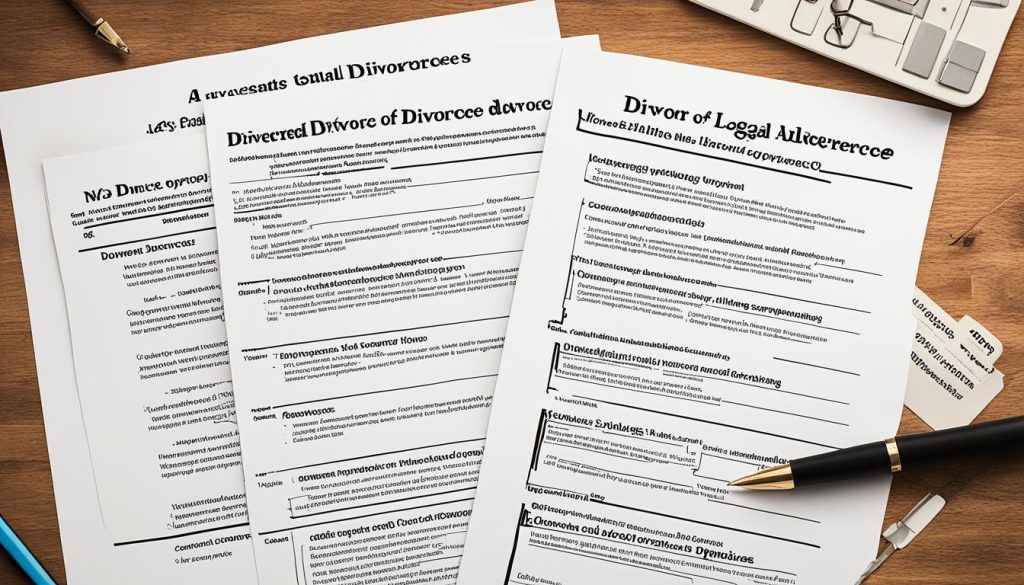Going through a divorce can be a complex and emotionally challenging process. From legalities to financial considerations, there are many aspects to consider when ending a marriage. If you’re living in Alberta and are contemplating divorce, this complete guide will provide you with all the necessary information to navigate the process smoothly. We will delve into the essential aspects of divorce in Alberta, including contested divorce, the entitlements of wives in Canada, and the relevant divorce laws in Alberta. By understanding the steps involved and your rights, you can make informed decisions and ensure a fair outcome for all parties involved. So, if you’re ready to embark on this journey, read on to learn everything you need to know about getting a divorce in Alberta.
Understanding the Divorce Process in Alberta
In Alberta, getting a separation agreement is usually the first big step for couples. This agreement shows the decisions they’ve made about things like property, alimony, child help, and how they’ll share parenting. Getting a divorce without this agreement is uncommon, especially if there are belongings or kids.
What is a Separation Agreement?
A separation agreement is like a rule book for a couple going through a separation. It decides how they’ll manage their assets, who will get support, and how they’ll take care of any kids. You can make this agreement through talking, using a mediator, or working together. Having this agreement ready can make the divorce process smoother and fairer for all.
Filing the Statement of Claim for Divorce
Next, in Alberta, you have to file the statement of claim for divorce. This step really gets the divorce process started. The claim states why you want a divorce and what you’re asking for, like support or how to split things. After filing, you need to make sure the other person gets these papers the right way, following the court’s rules.
Serving the Divorce Papers to the Defendant
Once you’ve filed for divorce, the papers must be served to the defendant properly. This means the other person has to be notified as the court directed. It’s important they know about the divorce so they can respond. Doing this step right is crucial. Messing it up could mean trouble and delays in your divorce.

Responding to the Divorce Claim
When you get a divorce document in Alberta, it’s key to take it seriously. If you ignore it, things can go bad fast. You might be called ‘in default’. This means the divorce can push ahead without you, leading to expensive and hard-to-fix issues.
1. Importance of Not Ignoring the Divorce Statement of Claim
Not responding to a divorce claim could mean the other person wins by default in court. The court might decide on things like who gets the house or who looks after the kids, without hearing your side. Taking action is crucial, because not addressing the claim can have big legal and money effects.
2. Remaining Calm When Receiving the Divorce Statement
Receiving divorce papers is tough, but staying calm is important. Jumping to quick decisions is a bad idea. Instead, read the documents well, know your legal needs, and get advice. This protects your rights as things move forward.
3. Noting Critical Deadlines and Dates
When you get a divorce claim, keeping track of the important times is a must. In Alberta, you usually have 20 days (more if you’re not in the province) to respond. If you don’t respond on time, the case may move ahead without you. So, understanding the timelines and acting quickly is vital to keep your rights.
| Key Steps | Timelines | Consequences of Inaction |
|---|---|---|
| Filing a Statement of Defense | 20 days (or longer if out of province) | Defendant noted in default, divorce proceeding without their involvement |
| Disputing the Divorce Claim | Within the specified time frame | Defendant’s rights and interests not considered in the court’s decisions |
| Seeking Professional Legal Advice | As soon as possible | Increased risk of unfavorable outcomes, lack of protection for one’s rights |

How to Get a Divorce in Alberta?
The divorce process in Alberta has many important steps. Once served a divorce claim, the other spouse has 20 days to respond. They can file a statement of defense if they disagree. What is the first step to getting a divorce in Alberta? Not responding allows the plaintiff to move ahead without the defendant’s say.
1. Disputing the Statement of Claim for Divorce
If the defendant disagrees, they must file a statement of defense in time. This explains why they don’t support the divorce or its terms. How much does it cost to get a divorce in Alberta? This step lets the defendant share their side in the divorce process.
2. The Signing of the Divorce Judgment
After all disputes are settled, the court issues a divorce judgment. This document ends the marriage and decides asset division, spousal support, and child custody. How to get a divorce in Alberta includes navigating this key stage carefully.
3. Requesting a Certificate of Divorce
The last step in the Alberta divorce process is to get a Certificate of Divorce. This certificate proves the divorce is final. It’s needed for legal and financial reasons after the divorce.

Types of Divorce in Alberta
In Alberta, there are three main types of divorce you may hear about. These include joint divorce, uncontested divorce, and contested divorce. Each type has its own process and rules. Knowing these options can help make the divorce journey easier.
1. Joint Divorce: The Ideal Solution
A joint divorce is often seen as friendly and direct. In this type, both partners agree on everything. This includes dividing property, supporting each other, and raising children. If you got married in Canada and are now in Alberta, handing a joint divorce can be simpler. Plus, it’s usually quicker and cheaper than other methods.
2. Uncontested Divorce: A Straightforward Solution
If a divorce happens without a fight, it’s called an uncontested divorce. This means both sides easily agree on the separation details. It’s considered a smooth and cost-friendly way, ideal for those already on the same page.
3. Contested Divorce: An Unfortunate Situation
But not every divorce ends peacefully. A contested divorce happens when both parties can’t agree. They might fight over various issues like money, support, or who gets custody of the children. This kind of divorce is harder, takes longer, and can be very stressful. It’s a tough path to go down for everyone involved.

Getting Professional Assistance for Divorce
Getting help with your divorce case in Alberta is often very wise. Even if your divorce is friendly, it’s still a good idea to consider hiring an alberta divorce lawyer. This is especially true for ensuring paperwork is done right and on time.
Working with an alberta divorce lawyer offers big benefits. These experts know the divorce laws in Alberta well. They can make sure all needed documents are correct and time is not wasted.
If your divorce is more complicated or not friendly, a lawyer becomes even more important. A good lawyer will fight for your interests. They help with dividing assets, deciding child custody, and making spousal support fair.
Another option is alberta divorce mediation. This method involves a neutral mediator helping both sides. Together, they try to find solutions everyone can agree on. It often makes the process smoother and less costly.
The choice to hire help depends on your situation. Knowing about both alberta divorce lawyers and alberta divorce mediation helps in making the right decision. Aim for a process that fits your needs well, ensuring an easier move to your new life.
Conclusion
This detailed guide explored the divorce process in Alberta, Canada. We covered the essential steps, types of divorces, and the need for professional help. With this information, you’re ready to manage a joint, uncontested, or contested divorce.
Every divorce with children in Alberta is different. It’s vital to consult experienced lawyers or mediators to protect your rights. Knowing Alberta’s divorce laws lets you make choices fitting your case for the best outcome.
Are you starting a divorce or already in the process? This guide outlined each step, from statement filing to the different divorce types. Armed with this knowledge, approach your divorce confidently. Take the right steps to a new chapter in life.
FAQ
1. How much does it cost to get a divorce in Alberta?
The price of a divorce in Alberta changes based on the case’s complexity and if a lawyer is involved. For simpler, agreed divorces, couples can do most steps themselves to keep costs down. But, if legal help is needed, costs can go up, even for simple cases.
2. What is the first step to getting a divorce in Alberta?
First, in Alberta, getting a divorce often starts with creating a separation agreement. This agreement outlines decisions about property, spousal and child support, and parenting. While some may go straight to divorce, it’s less common without this agreement unless there are no kids or property to divide.
3. What will I lose if I get divorced?
In Alberta, what’s lost in a divorce varies by case. It depends on the marriage length, kids, and how property and debts are divided. It’s smart to get legal advice to understand what rights and possessions might be at risk.
4. Can I divorce without a lawyer in Alberta?
It’s yes for divorcing without a lawyer in Alberta, especially if it’s agreed. Parties can handle the paperwork and filing themselves or get some assistance. But, legal experts advise having a lawyer to protect your interests, even when it seems straightforward.
5. Do it yourself separation agreement Alberta?
Creating a separation agreement in Alberta without a lawyer is possible, also known as DIY. But, ensuring it’s complete and legally sound is crucial. It’s wise to get advice from a family law expert to be sure it covers everything you need.
6. What is a wife entitled to in a divorce in Canada?
In Canada, a wife might rightfully get a fair share of assets, spousal and possibly child support. What’s awarded and how assets are shared follows specific laws and case circumstances, such as those in Alberta.
7. How to get a divorce in Alberta?
The steps to divorce in Alberta include: 1) making a separation deal or deciding on divorce terms, 2) filing for divorce, 3) delivering divorce papers to the other party, 4) handling the divorce claim, and 5) finishing with a signed judgment and divorce certificate.




